JANUARY 2017 - CIFE lunchtime debates are launched
The Office of CIFE in Brussels and the Group of CIFE Alumni in Brussels launched a series of public debates to discuss crucial subjects of European actuality.
"Turkey's accession and the European Union's integration capacity" was the theme of the first debate, which brought together some thirty participants over lunchtime, including many (young) former CIFE students. The first debate took place on Tuesday 30 January 2007 at the University Foundation.
Guest speakers: ALP Yaprak, Counsellor, Permanent Delegation of the Republic of Turkey to the EU and STUBB Alexander, Member of the European Parliament (PPE-DE, FIN).
| |
| |
|
27th CIFE Lunchtime debate
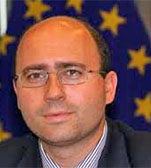 Tuesday 17 December 2013 Tuesday 17 December 2013
Topic: Research and Innovation for a Sustainable World
Guest speaker: Domenico ROSSETTI di VALDALBERO*, Principal Administrator, DG Research and Innovation, European Commission
*in a personal capacity
“Horizon 2020 is not just about research and innovation, crucial though they are. Horizon 2020 has much bigger ambitions – to play a major role in Europe’s fight for jobs and growth”. Máire Geoghegan-Quinn, Member of the European Commission responsible for Research, Innovation and Science, 20 November 2013.
26th CIFE Lunchtime debate
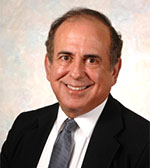 Tuesday 9 July 2013 Tuesday 9 July 2013
Topic: Revitalising the European Dream: A corporate view
Guest speaker: Robert Gogel, CEO of Integreon, (a trusted provider of integrated legal, research and business support solutions to discerning professionals), Editor-in-Chief of The State of the European Union* annual conference.
*The 3rd annual edition of State of the European Union conference took place in Brussels on 6 June 2013. It was organized with the support of the European Executive Council (EEC). Its objective was to demonstrate, at a time when Europe is going through one of its more turbulent periods, that global companies still believe in Europe and that they have a ‘corporate view’ on how to most effectively and efficiently renew the European dream. www.stateoftheeu.eu
25th CIFE Lunchtime debate
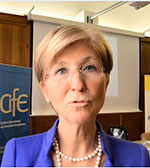 Wednesday 27 March 2013 Wednesday 27 March 2013
Topic: European Elections 2014: Which Role for the Media?
Guest speakers: Juana LAHOUSSE-JUÁREZ, Director-General for Communication, European Parliament
&
Christophe LECLERCQ, Founder of EurActiv.
Mrs Lahousse-Juarez presented the main lines of the EP communication strategy for 2014: while in 2009 the accent was put on citizens’ choice (“It’s your choice!” campaign), the 2014 campaign will be based on two pillars:
1/ Communicate on the European values (solidarity, freedom of expression,…),
2/ encourage the debate, focusing on the content of the EP legislative work and providing platforms for candidates and political parties to have a real European debate.
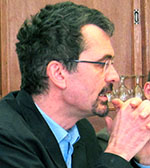 Mr Leclercq stressed the importance of including European topics in the national news cycles and decentralize the campaign. He also insisted that the EP 2014-2019 mandate should be clear: solve the crisis and adapt the EU. Many efforts still need to be made: need for primaries, need for more “top faces” (here, he suggested the introduction of a “party ticket of 5”, where each European party could propose candidates for the 5 top jobs: European Parliament, European Commission, European Council, Eurogroup presidents, and High Representative),… Mr Leclercq stressed the importance of including European topics in the national news cycles and decentralize the campaign. He also insisted that the EP 2014-2019 mandate should be clear: solve the crisis and adapt the EU. Many efforts still need to be made: need for primaries, need for more “top faces” (here, he suggested the introduction of a “party ticket of 5”, where each European party could propose candidates for the 5 top jobs: European Parliament, European Commission, European Council, Eurogroup presidents, and High Representative),…
(Newsflash of the European Movement International, March 27, www.europeanmovement.eu)
Click here to see the VIDEO 
|
24th CIFE Lunchtime Debate
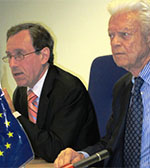 Tuesday 22 May 2012 Tuesday 22 May 2012
Topic: Is Federalism the Solution to the Crisis?
Guest speakers: Prof. Dusan SIDJANSKI, Special Adviser to the President of the European Commission – Hon. President of the Centre Européen de la Culture
& François SAINT-OUEN, Secretary-General of the Centre Européen de la Culture and the Denis de Rougemont Foundation - Lecturer at the European Institute, University of Geneva. François Saint-Ouen is the author of L’Avenir fédéraliste de l’Europe II – Du Traité de Maastricht à celui de Lisbonne - Bruylant, Bruxelles, 2011 (Foreword and Postscript by Dusan Sidjanski). Both invitees, François Saint-Ouen and Professor Dusan Sidjanski assessed that the discussion circa intergovernmentalism would merely reproduce solutions equivalent to those of the on-going financial crisis but that resorting to a federalist approach would be able to remedy the global crisis simultaneously preserving the principles of unity and diversity in Europe. Professor Sidjanski expressed ample concern about the current situation in Greece. In particular, and beyond the issues of the Euro and of the debt, he notes a degree of destabilisation – quote - “flakiness in the political system and a breakdown of solidarity within Greek society”.
23rd CIFE Lunchtime Debate
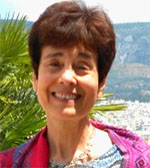 Wednesday 28 March 2012 Wednesday 28 March 2012
Topic: Memory and Policies: Reflections on the Eurozone Crisis and the Greek Case
Guest speaker: Catherine GUISAN,
Visiting Assistant Professor in the Department of Political Science, University of Minnesota
Catherine Guisan is the author of:
. Un sens à l’Europe: Gagner la paix (1950-2003), Paris: Odile Jacob 2003, and
. A Political Theory of Identity in European Integration: Memory and Policies, London and New York: Routledge, 2011.
|
22nd CIFE Lunchtime Debate
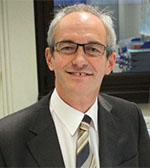 Friday 16 December 2011 Friday 16 December 2011
Topic: Perspectives for European Governance
Guest speaker: Richard CORBETT,
Member of the Cabinet of Herman Van Rompuy, President of the European Council.
"The steps taken over the last months – each one perhaps small in itself – amount cumulatively to a significant change already in our governance structures",
Herman Van Rompuy at the European Parliament, 16.11.2011.
21st CIFE Lunchtime Debate
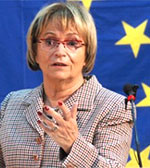 Wednesday 22 June 2011 Wednesday 22 June 2011
Topic: Investing more in Education and Youth Mobility
Guest speaker: Doris PACK, Member of the European Parliament, Chair of the EP Committee on Culture and Education. 2011 Jean Monnet Award Winner.
"Even in times of economic crisis, financing youth and education should not be considered as a cost in the present time but as an investment in the future of Europe" - EP Committee on Culture and Education, 13.04.2011
Doris Pack (PPE, DE) declared that the EP is really trying to improve the situation for students as far as possible. The EP is also trying to make the next education programmes user-friendly and to use synergies so that all the money available to education can benefit to all specific programmes within the current Lifelong Learning Programme which have the right to exist. If the political will of the EP is clear, the one of the member states still needs to be verified...
20th CIFE Lunchtime Debate
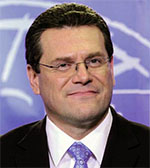 Tuesday 1 February 2011 Tuesday 1 February 2011
Topic: Inter-institutional Cooperation under the Lisbon Treaty
Guest speaker: Maroš ŠEFCOVIC,
Vice-President of the European Commission,
Responsible for Inter-institutional Relations and Administration.
The growing importance and complexity of inter-institutional relations requires a real culture of cooperation and a smooth system of internal communication between all European institutions - Maroš Šefcovic.
19th CIFE Lunchtime Debate
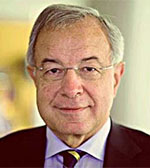 Wednesday 23 March 2011 Wednesday 23 March 2011
Topic: The European Union: a Legislative Giant, a Budgetary Midget?
Guest speaker: Alain LAMASSOURE,
Member of the European Parliament, Chairman of the Committee on Budgets.
In the past "finance ministers were reluctant to pay," but today in the context of the current crisis, "they are unable to pay."
If the deadlock surrounding the European budget is to be broken, the first line of attack must target the chains that bind it to national contributions.
Alain Lamassoure (quoted by Alain Frachon, Le Monde, 24.09.2010).
|
17th CIFE Lunchtime Debate
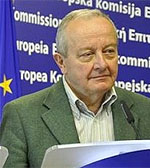 Wednesday 9 June 2010 Wednesday 9 June 2010
Topic: Europe 2020 Strategy: for a sustainable economic and social stimulus plan
Guest speaker: Mario SEPI,
President of the European Economic and Social Committee
Europe 2020 Strategy: for a sustainable economic and social stimulus plan.
16th CIFE Lunchtime Debate - Extraordinary Lunchtime Debate
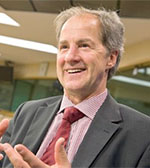 Thursday 25 March 2010 Thursday 25 March 2010
Topic: The EU towards Sustainable Development Discourse - Strategy - Action
Guest speaker: Jo LEINEN,
MEP, Chairman of the EP Committee on the Environment,
Public Health and Food Safety & the Directors of the CIFE – Asko Europa-Stiftung research project on Sustainable Development Discourses in European Countries.
*The outcome of the research has been published simultaneously by Nomos and in “L’Europe en formation”, CIFE’s journal of studies.
|
15th CIFE Lunchtime Debate
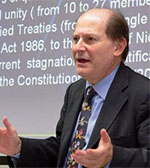 Tuesday 8 December 2009 Tuesday 8 December 2009
Topic: EU of the Lisbon Treaty What International Power?
Guest speaker: Prof. Mario TELÒ,
Vice-President of the Institute for European Studies,
ULB Ad personam Jean Monnet Chair.
Document: 
14th CIFE Lunchtime Debate - Extraordinary CIFE Lunchtime Debate
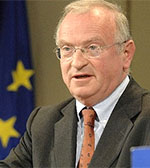 Thursday 12 November 2009 Thursday 12 November 2009
Topic: Multilevel Governance for Building Europe in Partnership
Guest speaker: Luc Van den Brande, President of the EU Committee of the Regions
Make your voice heard with the White Paper on Multilevel governance!
www.cor.europa.eu/governance
Speech by Luc Van den Brande: 
13th CIFE Lunchtime Debate
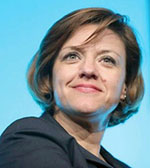 Tuesday 6 October 2009 Tuesday 6 October 2009
Topic: Copenhagen: Will the EU be a Climate Change Leader?
Guest speaker: Monica FRASSONI,
Former President of the Greens/EFA in the European Parliament,
Trustee of Friends of Europe.
12th CIFE Lunchtime Debate
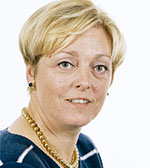 Wednesday 8 July 2009 Wednesday 8 July 2009
Topic: A new Parliament: for witch Europe?
Guest speaker: Annemie NEYTS-UYTTEBROECK,
MEP (ALDE, B),
President of the European Liberal Democrats (ELDR Party).
11th CIFE Lunchtime Debate
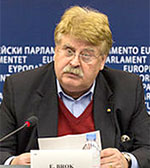 Tuesday 31 March 2009 Tuesday 31 March 2009
Topic: The EU at risk?
Treaty of Lisbon, EP Elections, Financial Crisis
Guest speaker: M. Elmar BROK,
MEP European Parliament.
10th CIFE Lunchtime Debate
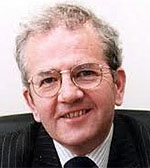 Tuesday 2 December 2008 Tuesday 2 December 2008
Topic: The EU's Next Enlargement : What Prospects for the Western Balkans?
Guest speaker: Graham AVERY,
Secretary General of the Trans European Policy Studies Association (TEPSA),
Hon. Director General of the European Commission.
9th CIFE Lunchtime Debate
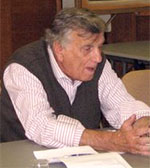 Tuesday 7 October 2008 Tuesday 7 October 2008
Topic: Traité de Lisbonne, Géorgie, Crise financière
Guest speaker: Ferdinando RICCARDI,
Journaliste et éditorialiste de l’Agence Europe.
3 sujets explosifs de l’actualité européenne : Traité de Lisbonne, Géorgie, Crise financière
(Ferdinando Riccardi est décédé vendredi 22 septembre 2017 à Bruxelles).
8th CIFE Lunchtime Debate
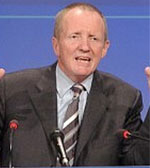 Tuesday 3 June 2008 Tuesday 3 June 2008
Topic: The role of EU Institutions - Helping create a European Public Space?
Guest speaker: M. Claus Haugaard SøRENSEN, Director-General, DG Communication, European Commission.
While we Europeans certainly debate a lot, most of our discussions take place within national circles. We lack a common European public space- an intellectual agora – and we do so at a time when the case for Europe is being contested and needs re-stating.
Javier Solana- Secretary-General of the Council of the EU and High Representative for the Common Foreign & Security Policy.
7th CIFE Lunchtime Debate
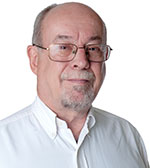 Tuesday 6 May 2008 Tuesday 6 May 2008
Topic: EU Enlargement: how far can it go?
Guest speaker: Alain SERVANTIE,Adviser, DG Enlargement, European Commission
In future enlargement policy, we must take into consideration the EU's capacity to integrate new Members.
When doing this, it is of paramount importance that we also keep our own strategic interest in mind.
Olli Rehn, EU Commissioner for Enlargement, 8 April 2008.
6th CIFE Lunchtime Debate
 Tuesday 29 January 2008 Tuesday 29 January 2008
Topic: The Treaty of Lisbon: what next ?
Guest speaker: Jo LEINEN, MEP, Chairman of the Committee on Constitutional Affairs.
“The Lisbon Treaty is not the end, the process goes on” commented Jo Leinen, the guest speaker of the 6th CIFE Lunchtime Debate on 29 January 2008. Leinen qualified the Lisbon Treaty as a big step towards a stronger political Union as it reinforces Europe’s capacity to act strongly together. Nevertheless, Leinen voiced his concerns about the new Treaty by regretting that the "constitutional approach" had been abandoned and by criticizing the “opt-outs” or special arrangements for some Member States. The new Treaty helps to enhance the European Union's democratic accountability, guarantees a better protection of citizens' rights and improves the efficiency of the EU institutions. Member States must quickly ratify the Reform Treaty by January 1st 2009 to be well prepared for the June 2009 European elections, said Leinen. “Only with a real European election campaign on the basis of the Lisbon Treaty”, Leinen stated, “the President of the Commission will be elected by the European Parliament in the light of the European election results, after being proposed by the European Council”. “This will be a big step forward to give the Union a face and allow the Citizens to know clearly for what purpose they voted”, highlighted Leinen. During discussion with some 40 participants Leinen advocated a quick, smooth and transparent ratification process as being vital for the future of the EU; he very frankly gave his opinions on the functioning of the institutions under the new Treaty rules, the impact of the future High representative and future external action service, on the EU’s role in the world and on citizens participation in the big project of the Union in the 21st century.
|
5th CIFE Lunchtime Debate
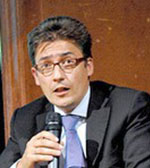 Tuesday 27 November 2007 Tuesday 27 November 2007
Topic: Citizens and the Future of Europe - The lessons from the 1st Deliberative Poll, Tomorrow’s Europe
Guest speaker: Henri MONCEAU,
Programme Director for Transnational Governance and Deliberative Democracy,
Notre EuropeTomorrow’s Europe is the 1st Pan-European Deliberative Poll on the future of Europe.
www.tomorrowseurope.eu - Notre Europe is a think tank dedicated to European unity. It was founded by Jacques Delors.
4th CIFE Lunchtime Debate
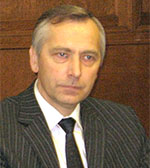 Tuesday 9 October 2007 Tuesday 9 October 2007
Topic: Educating today the Europeans of tomorow to construct Europe
Guest speaker: Jan FIGEL, European Commissioner responsible for Education, Training, Culture and Youth
Mr. Ján Figel, illustrated his vision of a really integrated Europe generated through shared values, managed by wisdom, driven by real European citizens: “Integration is only possible with education”. Mr. Figel qualified the impact of education and training not only limited to the growth of Europe’s GDP, but also as being vital for living together in peace, for personal development, for social inclusion and active citizenship. Following the « success story » of Erasmus, Mr. Figel voted for an integrated approach to lifelong learning and for more mobility within the educational systems as being crucial for Europe’s future position in the globalized world. Within the global economy knowledge and skills are the foundations on which an integrated Europe must be built, Mr. Figel stated. European future strongly depends on the quality of education and training systems, on culture and creativity and on the capacity for innovation. However, European policy in Culture, Education, Youth, Sports and Training must be focused on two dimensions: the contribution of education and training to jobs and growth as well as its contribution to personal development, to solidarity and to citizenship. The main future challenges Europe faces – demography, innovation and combining excellence, quality, efficiency with equity – are closely linked to the two dimensions of European education and European cultural diversity. “For this reason”, Mr. Figel underlined, “we need a genuine European area of lifelong learning for all. Therefore the European Commission is committed to supporting the Member States in their efforts to develop and implement successful lifelong learning strategies which are coherent, comprehensive and built on solid evidence.”
3rd CIFE Lunchtime Debate
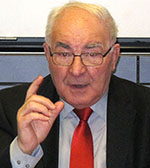 Wednesday 6 June 2007 Wednesday 6 June 2007
Topic: Europe and the Global Challenges
Guest speaker: Riccardo PETRELLA, Founder of the Lisbon Group, Secretary general of the International Committee for the Golbal Water Contract, and -among other titles- Alumnus of CIFE (University College of Federalist Studies, Aoste 1963 and Sèvres 1964)
Prof. Riccardo PETRELLA, calls for an alternative EU's global role focussing on fewer global issues and more coherent policies. He identified and discussed his alternative vision for the EU's global role. The global economy of natural resources has to be inspired by a "human" perspective reflecting human rights, social cohesion, democratic participation, rule of law and a value-based ecological balance . Europe has to develop such a global strategy to save the living perspectives of its people.
Following Riccardo PETRELLA Europe is in urgent need for such a comprehensive global strategy for the 21st century. He votes for an improved policy agenda of the Union. The EU should focus on fewer "global" issues and be more coherent . The EU's strategies to beat famine, diseases, to prevent ecological disasters are not sufficient. EU-water policy for example must be underpinned coherently by policies in other areas such as development, trade and energy to show results. Future institutional and structural reforms should create a more streamlined, transparent and legitimate organisation with improved multilateral cooperation mechanisms including civil society and improved lesson-learning between the Member States to better meet global challenges. Petrella warned: "Time is out!", il est urgent que l'Europe développe une telle stratégie globale pour le 21ème siècle.
2nd CIFE Lunchtime Debate
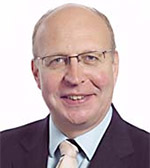 Tuesday 27 March 2007 Tuesday 27 March 2007
Topic: How to rescue the European Constitution: "Mini-treaty" or "Constitution Plus"?
Guest speaker: Andrew DUFF, MEP (ALDE, UK) calls for a roadmap with a clear timetable at the end of the German Presidency.
Europe should not give up to fight for the Constitutional Treaty, should continue to transform itself in order to adapt to future challenges. Guest speaker Andrew DUFF, MEP, ALDE Spokesman on Constitutional Affairs, stated that the Berlin Declaration from last Sunday reflects a strong scepticism towards institutional reform by states like the Czech Republic, Poland, the UK and the Netherlands. Nevertheless, reforming the Union is at stake. Duff's fervent plea for a "Constitution Plus" rejects the recent arguments for a "Mini-treaty" as being "dubious law, poor tactics and bad politics". Instead, Duff proposes to ring-fence part I and II of the Constitutional Treaty from being opened up again and strongly advocates a " small number of highly significant improvements" to the remaining parts, the most important of which are a simplified revision procedure, referring to full employment (Art. III-177), including the Lisbon goals, formalizing the Euro Group, declaring the social dimension of the Union, including common energy policy and reforming CAP. Having a roadmap with a clear timetable to be agreed at the end of the German Presidency would be the best to be achieved at the moment , Duff pointed out. Hopefully, the Union does not commit an historical mistake by further stalling the constitutional question. It is high time for the Europe to take a decisive initiative. Tanya WITTAL-DÜERKOPP, Group of CIFE Alumni in Brussels, Bruno BOISSIERE, Director of the office of CIFE in Brussels.
First CIFE Lunchtime Debate - TURKEY’S ACCESSION AND THE EUROPEAN UNION’S INTEGRATION CAPACITY
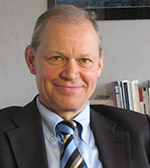 Tuesday 30 January 2007 Tuesday 30 January 2007
Topic: TURKEY’S ACCESSION AND THE EUROPEAN UNION’S INTEGRATION CAPACITY
Guest speakers:
- Hartmut MARHOLD, CIFE Director General,
- ALP Yaprak, Counsellor, Permanent Delegation of the Republic of Turkey to the EU,
- STUBB Alexander, Member of the European Parliament (PPE-DE, FIN).
The first debate took place on Tuesday 30 January 2007
Ce premier débat a réuni, à l'heure du déjeuner, une trentaine de participants dont de nombreux (jeunes) Anciens étudiants du CIFE.
Hatmut MARHOLD, animateur du débat, a souligné que la question controversée de l'adhésion de la Turquie à l'Union européenne donne lieu à des argumentations largement réversibles de part et d'autres. Les européens devraient donc bien peser les "pour" et les "contre" en se fondant sur leurs valeurs. Alexander STUBB, a estimé que le concept de capacité d'intégration ne devrait pas distraire l'Union européenne de sa responsabilité de mettre de l'ordre dans sa maison au lieu de porter l'attention sur les efforts à réaliser par les pays candidats. La résolution que le P.E. a adoptée sur la base de son rapport refuse que la capacité d'intégration de l'Union devienne une nouvelle condition de l'élargissement ; elle doit être un critère à prendre en compte par l'Union elle-même dans sa tâche de réforme. La résolution du P.E. confirme que le Traité de Nice en vigueur n'est pas suffisant pour tout nouvel élargissement et qu'une Constitution européenne devrait entrer en vigueur avant 2009. Sur les aspects institutionnels de la capacité de l’U.E. à intégrer de nouveaux membres, il a estimé que le concept de capacité d'intégration ne devrait pas distraire l'Union européenne de sa responsabilité de mettre de l'ordre dans sa maison au lieu de porter l'attention sur les efforts à réaliser par les pays candidats. La résolution que le P.E. a adoptée sur la base de son rapport refuse que la capacité d'intégration de l'Union devienne une nouvelle condition de l'élargissement ; elle doit être un critère à prendre en compte par l'Union elle-même dans sa tâche de réforme. La résolution du P.E. confirme que le Traité de Nice en vigueur n'est pas suffisant pour tout nouvel élargissement et qu'une Constitution européenne devrait entrer en vigueur avant 2009.
Autre invitée de ce 1er "Midi du CIFE", Yaprak ALP, s'est déclarée confiante que l'année 2007 pourra permettre des avancées du processus constitutionnel européen et donc de la capacité d'intégration de l'Union. Par contre, la diplomate turque a jugé injuste la décision des gouvernements de décembre 2006 de ne pas ouvrir la négociation sur plusieurs chapitres. Elle a plaidé pour le renforcement du rôle de l'Union sur la scène internationale, l'amélioration de l'efficacité du processus décisionnel.
Dépêche diffusée le 1er février 2007 par ABHABER.com, EU-Turkey News Network, relative au premier "Midi du CIFE" organisé à Bruxelles le 30 janvier dernier sur le sujet "Turkey's Accession and the EU's Integration Capacity" 

|
|